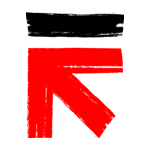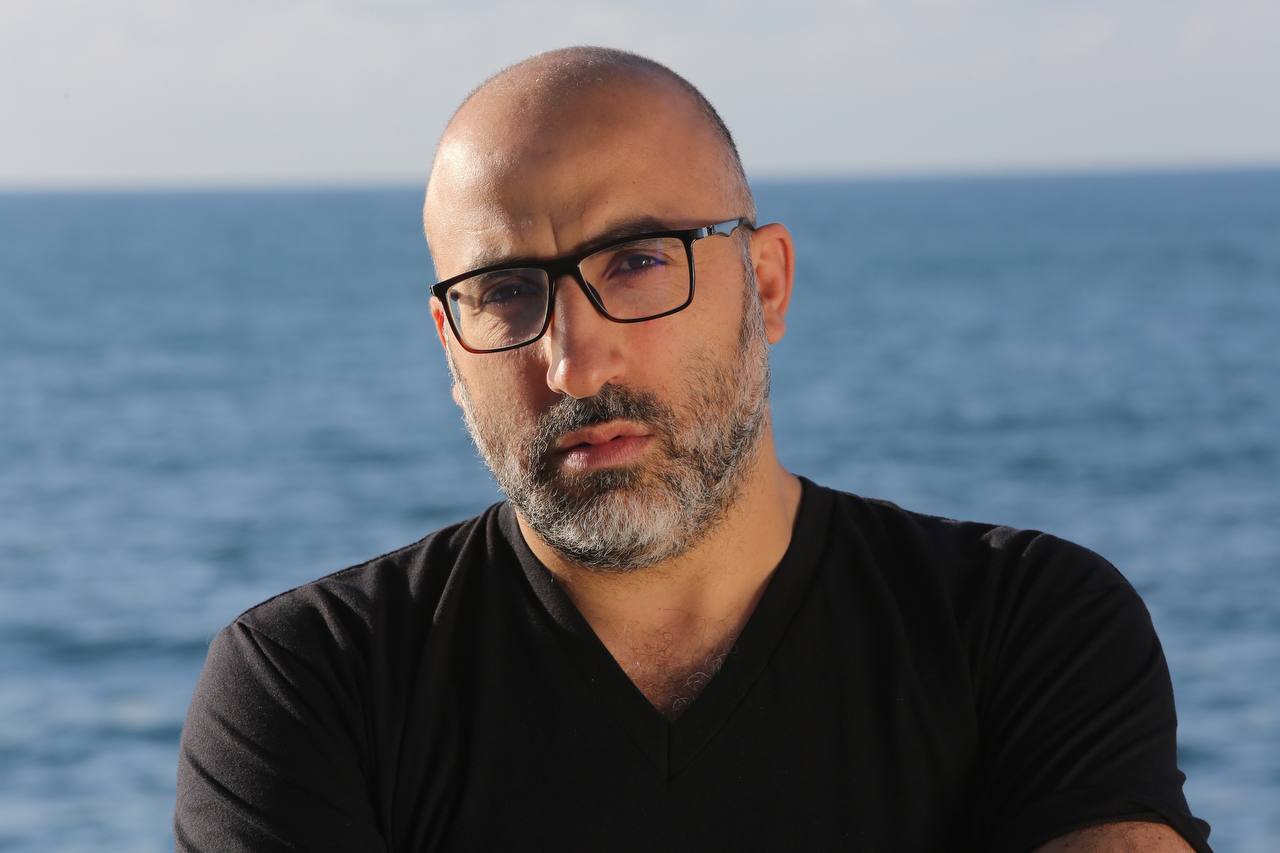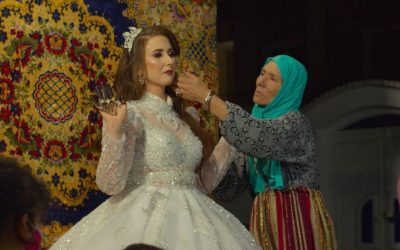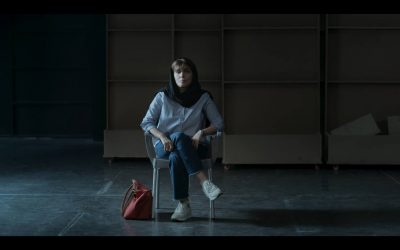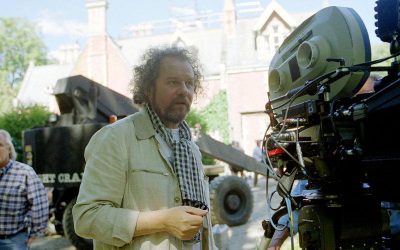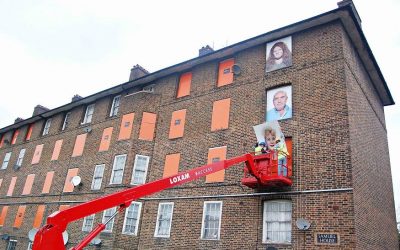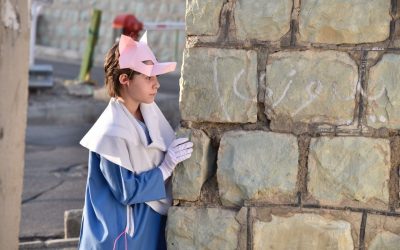Ahmad Ghossein is a Filmmaker and an artist. He holds an MFA in Visual Art from the National Academy of Art-(KHIO) in Oslo and a BFA in Theater from the Lebanese University, Beirut. Ghossein’s latest short film, White Noise, which was produced under the auspices of “Lebanon Factory,” opened the Director’s Fortnight of the Cannes Film Festival (La Quinzaine des Réalisateurs – Cannes) 2017. He won the Best Director Prize at the Beirut International Film Festival 2004 for his graduate short film Operation Nb… His film My Father Is Still a Communist, 2011, was awarded best short film in Tribeca Doha Film Festival 2011 and was selected by MoMa and Berlinale and several festivals. His other short The Fourth Stage opened the Forum Expanded of Berlinale Film Festival 2016. Ahmad has directed several documentaries, short films, and videos. Other works include: The Last Cartography in the Republic (2017), 210m (2007) commissioned by Ashkal Alwan, Faces applauding alone (2008), What Does Not Resemble Me Looks Exactly Like Me (2009) with Ghassan Salhab and Mohamad Soueid, An Arab Comes to Town (2008), a documentary filmed in Denmark produced by DR2. He was awarded the Production Program Award by the Sharjah Art Foundation in 2014, the Ibsen Scholarship Award in 2013, and Best Short Film in the Doha Tribeca Film Festival in 2011. He is also the co-curator of CO2, an artistic platform in Beirut. Ghossein’s work has been exhibited in different museums and galleries and has been screened in various film festivals around the world the including Museum of Modern Art (MoMA) and New Museum in New York, Sharjah Art Foundation, Center Pompidou in Paris, Oslo Kunstforening, Kunsthall in Oslo, With Koro (Uro) in Oslo, Ashkal Alwan’s Home Works in Beirut, SeMA Biennale Mediacity Seoul, Nam June Paik Art Center in South Korea, MuCEM museum in Marseille, Nikolaj Kunsthal in Copenhagen, the Bétonsalon in Paris, the Haus am Waldsee art space in Berlin, Berlinale Film Festival, Dubai Film Festival, Oberhausen Film Festival, and the Fid Marseille Film Festival.
RedCut: The film “My Father is Still a Communist” was at the Berlinale and the Sharjah Biennale among others, and it is now part of the permanent collection at the Pompidou Museum. The film is about: The background material for the video is a large number of radio cassettes sent between my parents, Rachid Ghossein and Maream Hmada during the years of civil war in Lebanon. Rachid was working abroad, sending money back to the family in south Lebanon. The project aims to portray their relationship through this period. Could you let us know why you decided to make this film? What was the idea behind it?
Ahmad: I think this film marks the beginning of my attempt to blend the personal with the social and political contexts in all its forms. The idea of the film originated from the existence of an audio archive, which I turned to understand the relationship between my parents and how they lived during the civil war and the Israeli invasion. Discovering 50 hours of recordings was not an easy exercise, listening to my parents’ stories and rearranging my memories was challenging. I had to separate between the personal and the filmmaker who intended to make a film about a relationship between two lovers that changed with the economic and social conditions in the country. From the outset, I was aware that the audio material in front of me was powerful, emotional, and of great documentary importance. I had to explore the synchronization of sound with image, the meaning of waiting and time in the image, while the sound progresses in a clear chronological sequence. I had to decide when the sound and image should converge and when the image should move in contrast to the sound, reflecting the story my mother tells, in contrast to the chronological order. For example, one choice was to omit the father from the film and only show him in family photographs where I digitally placed him at his current age using Photoshop. I dealt with the sound as both a personal and general archive, as my mother narrated the story of the country, the war, and the changing economic conditions, as well as her love, longing, and exhaustion. With the image, there was an obsession with time and temporality. The film was not easy in terms of tampering with my memory and separating myself as an individual from the filmmaker who wanted to understand the relationship between my parents, with a father who emigrated to the Gulf during the oil fever boom and a mother trying to raise four children alone in a country witnessing brutal civil wars.
RedCut: The film All this Victory, a feature film that Premiered at the Venice Film Festival 2019, won the Grand Prize and the Audience Award at the Venice International Film Critics’s Week. The film is about Lebanon, July 2006. War is raging between Hezbollah and Israel. During a 24h ceasefire, Marwan heads out in search of his father who refused to leave his Southern village, and leaves his wife Rana preparing alone for their immigration to Canada. Marwan finds no traces of his father and the ceasefire is quickly broken, forcing him to take shelter in Najib’s house, his father’s friend. Marwan finds himself trapped under the rain of bombs with Najib and a group of elders, friends of his father. Tension rises inside and outside of the house. Suddenly, a group of Israeli soldiers enter the first floor. The next three days see the situation spiral out of control. Did you live in Lebanon during the war? What was your experience and why did you decide to make this film? Is it the idea rooted in your experience?

Ahmad Ghossein
Ahmad: Let me begin by saying that I won’t be revisiting the theme of war or making a film about or through war. I’ve lived my entire life in Lebanon, a country plagued by recurrent wars and constant tension. Therefore, there’s no need for a filmmaker to always react to the circumstances they’re living in, to feel compelled to make films as a reaction to their experiences. It’s not an easy exercise; after all, you’re living and experiencing the daily conditions. I’m not saying that cinema shouldn’t address the current situation in a country experiencing a severe economic crisis and ongoing war. Still, I want to explore a cinematic language beyond all the daily noise we’re experiencing in Lebanon right now. The film is based on a true story I heard during the 2006 war. It’s not a new story, and cinema’s treatment of a group besieged in a place with enemies surrounding them is not new either; cinema has addressed such topics before. However, every filmmaker must find his/her unique language and search for something new he/she wants to add, to narrate the story with different human and social dimensions. Yes, I was in Beirut during the 2006 war and before that, during other wars. In this film, I wanted to explore the meaning of always being the victor, a mentality deeply ingrained in the Arab world. I wanted to challenge this discourse; in war, there are no true victors. I also wanted to create a film about a group trapped in a hostile environment and how their relationships with each other and with their bodies are shaped by fear. Additionally, characters from my parent’s generation, who lived through consecutive wars and fought, are now questioning the dream of change and how this dream was defeated. I attempted to create a film set during a war, but its story intersects with many shattered dreams in our Arab world, dreams of change, and dreams of a better homeland.
RedCut: The short film, The Fourth Stage, opened the Forum Expanded of the Berlinale Film Festival, Berlinale 2016. The film weaves a complex and unlikely union of illusion and myth between three concurrent worlds of which he is part: cinema, magic, and the changing landscape of southern Lebanon. Tell us more about this film too.
Ahmad: This film stemmed from my interest in spatial space. Once again, southern Lebanon is an area dense with social, political, and religious transformations. When a specific group or sect in Lebanon strengthens, the first thing it does is demand more authority and gains in the state, invoking its entire religious history and intensifying it to the point of myth, and that is what happens in the south. All of this remains within the framework of analysis, and as I always say, sometimes I see a scene or a form that suggests a film idea or suggests that this element or form is the door and key to the questions I pose. This is what happened in this film. I was driving when my eyes fell on concrete sculptures and monuments at road intersections. This is where the idea of the film began. First about the nature of these sculptures that invade our visual and spatial realm and at the same time, I was searching for the magician, the illusionist I remembered as a child, amazed by the magic he performed. In my teens, I accompanied this magician as an assistant and an organ sound effects player. We used to tour small villages, performing his show, and bringing joy to the children’s faces. I wanted to find out how this magician withdrew from the public sphere, replaced by a religious legend. After the 2006 war, some books spread stories that angels were fighting alongside the fighters. The legend grew, and no one wanted to believe that a magician could hide a rabbit in his hat anymore
RedCut: The film “The White Noise”, is a short film and the film is about: Said is doing his first night of duty as a security guard under the bridge in the middle of Beirut. With only a walkie-talkie and a torch, he is trying to take his job seriously. At sunrise, the city will have crushed him. The film premiered at the opening of Quinzaine at the Cannes Film Festival, in 2017. Can you tell us about the brigade and why you chose this amazing location? What was the connection between the bridge and your story in your mind?
Ahmad: This film was the result of a collaboration with the French director Luciae La Chimia. Once again, it seems that my interest in places, in space, comes to the forefront. I also started to take an interest in or observe the absurd situations that exist here. It is a dark comedy film about the state of the city at night and its character. In the 1990s, with the beginning of the reconstruction of downtown Beirut, which was destroyed, we began to see private security companies and their guards spread everywhere. I don’t know what they were guarding, or why downtown needed private protection guards. I had worked for a week as a private security guard in one of these companies, on a night shift until dawn. I was guarding nothing; I just had to be on the street all night. I wanted to make a film about Beirut at night as well, with this guard watching the city’s mosaic, gangs, and a religious group tearing posters featuring a woman, and there is a man who wants to commit suicide from the top of the bridge. No matter how hard the guard tried to protect the bridge, it was eventually stolen.
RedCut: The films you make completely express the confrontation with a visual artist. The narrative style that dominates the image and the images that sometimes lead us to extraordinary and believable theater in our cinema. When writing a story, do you first think about images, as if the mind is image-centric in narration, or do you write the story first and then search for the image?
Ahmad: This depends on the project. But I can say that it usually starts with an idea. I can’t say what comes before what, I can’t separate between the story and the image. I’m not interested in stories that take on psychological dimensions and are divided into a complex, resolved, beginning, and end. I’m not against this, but I can’t think in that direction. Several projects started with an idea and concept, or even an archive I found. I’m interested in documenting societal changes and problems, and our image of ourselves. Therefore, I use different mediums to understand our current reality.
RedCut: Today, the handheld cameras of the people in Palestine are telling the truth and exposing the crimes of Israel. Do you think this harrowing historical experience will change the language of cinema? How do you see the responsibility of artists, filmmakers, and cinema in the face of this atrocity?
Ahmad: What we are witnessing is genocide in every sense of the word. Here, at this moment, I don’t know the importance of cinema, to be honest. Thinking about a film or a story seems very trivial in the face of the horrible reality, in the face of the catastrophe. But cinema is an important tool and I think Palestinian cinema is very rich in its diversity and its ability to dismantle colonial discourse, apartheid, and the crimes that have been happening daily for decades. cinema in any case doesn’t work on reactions so I think we need enough time to see what changes will occur in cinematic language.
Redcut: In the current circumstances where the power of art and cinema is in the hands of the capitalist system, how much sustainability do you think independent cinema and independent thought have?
Ahmad: This is an ongoing and open discussion, and I don’t think anyone can eliminate independent cinema or cinema that is not tied to market demand. As long as there is a camera and a director or artist who wants to express an idea or issue, this cinema will exist. In any case, even away from the market, sometimes, this cinema is subject to various challenges, including grant policies and festival policies, meaning cultural policies that make certain social issues a trend. But I believe that independent cinema, despite its production difficulties, will continue.
